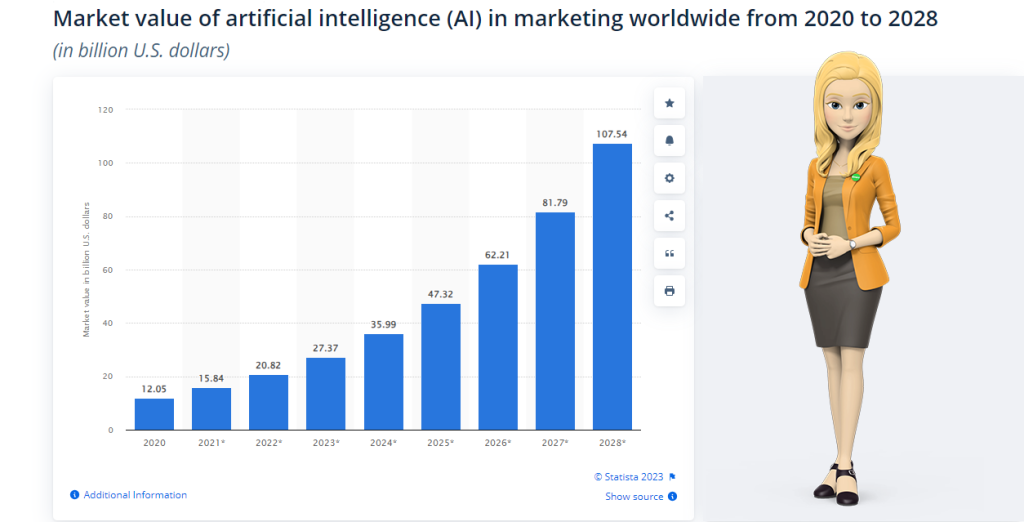AI marketing Sri Lanka is the second part of this three-part series. If you have not read the first part click here to read it.
In the first part we talked about AI (Artificial Intelligence) animation, and how the AI conversation was shaping up the Sri Lankan business community. In this segment we will discuss the impact of AI on marketing: revolutionizing the way businesses understand, engage, and target their customers.
AI Marketing Sri Lanka – How to Market Your Business
The traditional marketer’s role (in the past) involved working independently or within a team analyzing consumer data. The outcomes depended on the reliability of the data and the creativity of the team. With the advancement of analytics driven marketing (youtube, facebook, twitter, insta, etc) the data became more reliable and accurate. These marketing campaigns had remarkable ROI (Return On Investment) than the campaigns done on traditional models. Fast forward to the present: AI marketing involves analyzing vast amounts of data, gain insights, and make data-driven decisions to optimize marketing strategies and campaigns.
To run an effective AI marketing campaign in Sri Lanka, we rely on the subscription of third-party affiliates. The AI engines of these affiliates uses artificial AI to make automated decisions based on data collection, data analysis, and additional observations of audience or economic trends that may impact marketing efforts. While very expensive, AI marketing can put your brand visibility in hyperdrive with targeted messaging. They can boost engagement with existing customers and prospects to generate leads and also analyze their data to provide you with fine-grained insights for predictive and prescriptive marketing. In 2023* it is estimated that global AI marketing will exceed 27 billion dollars (US). If you need a free consultation Contact Us and we can dive in to more detail as to what we can do for your business.
* https://sproutsocial.com/insights/ai-marketing/
AI Marketing Sri Lanka – key areas AI can be influential in marketing:
Customer Data Analysis: AI enables businesses to analyze vast amounts of customer data to gain insights and understand customer behavior patterns. By leveraging machine learning algorithms, AI can identify trends, preferences, and correlations that humans may not easily detect. This analysis helps in segmenting customers, personalizing marketing campaigns, and predicting future customer behavior.
Personalization and Targeting: AI-powered algorithms can analyze customer data to deliver personalized experiences and targeted marketing messages. AI can dynamically tailor content, product recommendations, and advertisements to suit individual customers’ preferences, increasing engagement and conversion rates.
Chatbots and Virtual Assistants: AI-driven chatbots and virtual assistants are widely used in marketing to provide instant customer support, answer queries, and guide users through the sales funnel. These intelligent systems can simulate human-like conversations, assist with product recommendations, and handle basic customer interactions, freeing up human resources and providing 24/7 support.
Predictive Analytics: AI algorithms can forecast customer behavior and predict future outcomes based on historical data. This helps marketers make data-driven decisions, optimize marketing campaigns, and allocate resources effectively. Predictive analytics can also identify potential churn, detect fraudulent activities, and anticipate customer needs.
Content Creation and Curation: AI technologies can generate and curate content at scale. Natural Language Processing (NLP) algorithms can write blog posts, social media updates, and product descriptions, saving time and resources for marketers. AI can also curate content by analyzing vast amounts of data and recommending relevant articles, videos, or products to individual users.
Marketing Automation: AI-powered marketing automation platforms streamline repetitive tasks such as email marketing, social media scheduling, and lead nurturing. These platforms can automatically segment customers, trigger personalized messages, and analyze campaign performance, allowing marketers to focus on strategy and creative aspects.
Image and Video Analysis: AI algorithms can analyze visual content, including images and videos, to extract valuable information. This enables marketers to understand how consumers engage with visual media, detect brand logos or products in user-generated content, and optimize ad placements accordingly.
Voice Search and Optimization: With the rise of voice assistants like Siri, Alexa, and Google Assistant, AI plays a crucial role in voice search optimization. Marketers can use AI techniques to understand user intent, optimize content for voice queries, and improve website rankings in voice search results.
It’s important to note that while AI has transformed many aspects of marketing, human creativity, strategy, and ethical considerations remain critical for successful marketing campaigns. AI should be used as a tool to enhance decision-making and customer experiences, working hand-in-hand with human marketers.







One Response